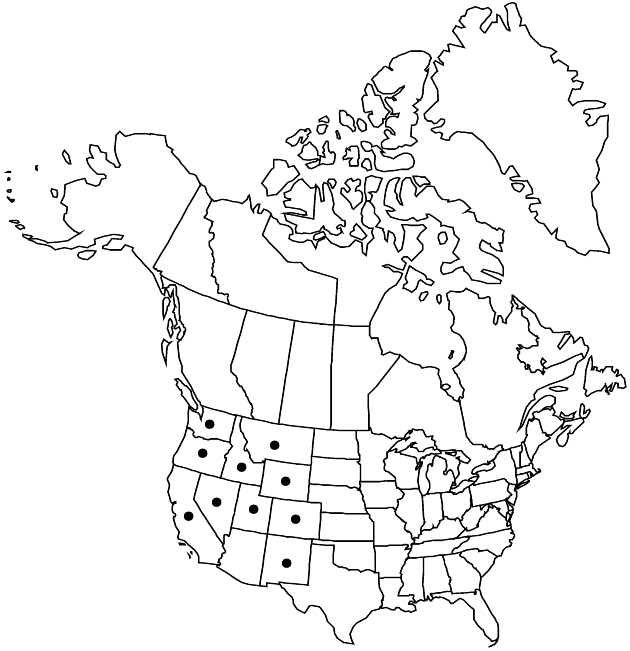Difference between revisions of "Antennaria corymbosa"
Bot. Gaz. 27: 212. 1899.
FNA>Volume Importer |
FNA>Volume Importer |
||
| Line 12: | Line 12: | ||
|name=Antennaria acuta | |name=Antennaria acuta | ||
|authority=Rydberg | |authority=Rydberg | ||
| − | }}{{Treatment/ID/Synonym | + | }} {{Treatment/ID/Synonym |
|name=Antennaria dioica var. corymbosa | |name=Antennaria dioica var. corymbosa | ||
|authority=(E. E. Nelson) Jepson | |authority=(E. E. Nelson) Jepson | ||
| − | }}{{Treatment/ID/Synonym | + | }} {{Treatment/ID/Synonym |
|name=Antennaria hygrophila | |name=Antennaria hygrophila | ||
|authority=Greene | |authority=Greene | ||
| − | }}{{Treatment/ID/Synonym | + | }} {{Treatment/ID/Synonym |
|name=Antennaria nardina | |name=Antennaria nardina | ||
|authority=Greene | |authority=Greene | ||
| Line 36: | Line 36: | ||
|elevation=1900–3500 m | |elevation=1900–3500 m | ||
|distribution=Calif.;Colo.;Idaho;Mont.;Nev.;N.Mex.;Oreg.;Utah;Wash.;Wyo. | |distribution=Calif.;Colo.;Idaho;Mont.;Nev.;N.Mex.;Oreg.;Utah;Wash.;Wyo. | ||
| − | |discussion=<p>Antennaria corymbosa is characterized by linear-oblanceolate basal leaves and white-tipped phyllaries, each with a distinct black spot near the base of the scarious portion. A form with black phyllaries (A. acuta) occurs sporadically throughout the range of the species (R. J. Bayer 1988). Antennaria corymbosa is a sexual progenitor of the A. rosea complex.</p> | + | |discussion=<p><i>Antennaria corymbosa</i> is characterized by linear-oblanceolate basal leaves and white-tipped phyllaries, each with a distinct black spot near the base of the scarious portion. A form with black phyllaries (A. acuta) occurs sporadically throughout the range of the species (R. J. Bayer 1988). <i>Antennaria corymbosa</i> is a sexual progenitor of the <i>A. rosea</i> complex.</p> |
|tables= | |tables= | ||
|references= | |references= | ||
| Line 60: | Line 60: | ||
|publication year=1899 | |publication year=1899 | ||
|special status= | |special status= | ||
| − | |source xml=https://jpend@bitbucket.org/aafc-mbb/fna-data-curation.git/src/ | + | |source xml=https://jpend@bitbucket.org/aafc-mbb/fna-data-curation.git/src/8f726806613d60c220dc4493de13607dd3150896/coarse_grained_fna_xml/V19-20-21/V19_656.xml |
|tribe=Asteraceae tribe Gnaphalieae | |tribe=Asteraceae tribe Gnaphalieae | ||
|genus=Antennaria | |genus=Antennaria | ||
Revision as of 15:13, 18 September 2019
Dioecious. Plants 6–15 cm. Stolons 1–10 cm. Basal leaves 1-nerved, spatulate, 18–45 × 2–4 mm, tips mucronate, faces ± gray-tomentose. Cauline leaves linear, 8–13 mm, not flagged (apices acuminate). Heads 3–7 in corymbiform arrays. Involucres: staminate 4–5.3 mm; pistillate 4–5 mm. Phyllaries (bases each with distinct dark brown or blackish spot) distally white or light brown. Corollas: staminate 2–3.2 mm; pistillate 2.5–3.5 mm. Cypselae 0.5–1 mm, slightly papillate; pappi: staminate 2.5–3.5 mm; pistillate 3.5–4.5 mm. 2n = 28.
Phenology: Flowering early–mid summer.
Habitat: Moist subalpine-alpine willow thickets in the Rocky and Cascade mountains, the Sierra Nevada and mountains of the Great Basin
Elevation: 1900–3500 m
Distribution

Calif., Colo., Idaho, Mont., Nev., N.Mex., Oreg., Utah, Wash., Wyo.
Discussion
Antennaria corymbosa is characterized by linear-oblanceolate basal leaves and white-tipped phyllaries, each with a distinct black spot near the base of the scarious portion. A form with black phyllaries (A. acuta) occurs sporadically throughout the range of the species (R. J. Bayer 1988). Antennaria corymbosa is a sexual progenitor of the A. rosea complex.
Selected References
None.